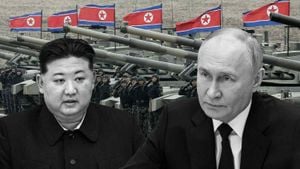With the U.S. presidential elections looming on the horizon, the outcomes are stirring significant concern and speculation across Latin America. Both Kamala Harris and Donald Trump have laid out their potential visions for U.S.-Latin America relations, yet experts suggest the region might remain on the back burner, regardless of who emerges victorious.
Peter Hakim, president emeritus of the Inter-American Dialogue, recently shared insights on the matter, emphasizing the lack of special interest the United States appears to hold for Latin America at this time. Hakim explained, "I don’t think the U.S. has any special interest in Latin America right now...the region is not what worries the country the most." The stark truth is, U.S. attention, he argues, will more likely be drawn to issues inconvenient to them, rather than fostering strong partnerships or economic development with Latin American nations.
This sentiment is echoed by many regional leaders who are nervously observing the developments. The migration crisis, for example, is one issue gaining overwhelming significance. If Harris sits behind the desk for the next term, her administration might endeavor to tackle the rising numbers of migrants attempting to enter the U.S., addressing the pressures stemming from Central America and other regions.
Meanwhile, the economic situation within Latin America adds another layer of complexity. Brazil's currency has taken a dip recently, hitting levels not seen for three months, driven by domestic uncertainties compounded by the chaotic climate surrounding U.S. elections. The Brazilian real has faced severe pressure, dropping due to doubts about the government's financial objectives and projected spending reductions. The broader Latin American market reflects this downturn, as traders become increasingly cautious about investing amid political uncertainties.
The MSCI Latin America currencies index recently fell by 0.4%, marking the continuation of a downward trend. Argentina, on the other hand, has made moves affecting its economy, significantly slashing its interest rates, hoping to stabilize and invigorate its market. Such divergent reactions highlight the complex interplay of politics and economic strategies employed by Latin American countries as they look to safeguard their futures amid American political volatility.
Political analysts and financial economists caution, though, even amid Harris's push for avenues to counter migration, any protracted U.S. election drama could lead to spilled repercussions, stretching from the U.S. first to the southern neighbor.
"For markets, this translates to unstable waters—Latin America’s currencies and stocks are under significant pressure as economic stagnation coils around Brazil coupled with U.S. political pitfalls diminishing investor confidence," observed one financial expert. The Brazilian Bovespa index fell 0.5% recently, reflecting similar regional aversion to risk.
Besides these immediate pressures, long-standing issues such as trade deals hang precariously with the potential election outcomes. Speculation continues over the impact of Trump's policies if he returns to office. His administration could reintroduce tariffs, particularly on autos, posing fresh inflation risks for Mexico and other countries reliant on trade relations with the United States. This precarious status quo has several Latin American markets on edge, anticipating rapid response measures they might need to adopt should policies shift dramatically.
Countries like Mexico and Colombia are particularly anxious about the advocacy and defensive mechanisms they may have to employ to shield their economic interests. Mexico might find unexpected opportunities if it can adjust to potential changes well, especially under 'near-shoring' dynamics, which could offer strategic advantages if Chinese imports suffer from increased tariffs.
Internally, Colombia’s fiscal strategies are also being reconsidered amid fluctuated oil prices affecting its currency value. This juggling act emphasizes how domestic policies need to swiftly respond to international pressures, offering only small respite from the broader socioeconomic difficulties gripping the region.
Beyond economic matters, social issues continue to affect the populace at large, and experts like Hakim warn against letting these challenges remain unaddressed. Latinos and immigrant communities within the U.S. are watching closely as the potential outcomes present either continuity or significant shifts impacting their lives.
Potential U.S. election outcomes will directly affect how neighboring countries can strategize future dealings. For now, Latin America remains cautiously alert as both candidates prepare for battle. It’s evident from the current developments—be it market indicators or political pledges—that the region is bracing for potential upheaval or, at the very least, searching for stabilizing pathways amid uncertainties.
While the upcoming elections pull U.S. leaders’ attentions, the wider Latin American populace feels the weight of this decision. Politicians and analysts alike seem united on one thing: regardless of the victor come November, Latin America must remain sufficiently vigilant to adapt to whatever waves roll out from Washington.



